Unit 7 Comicstrip & Welcome to the unit 课件(共有PPT21张)
文档属性
| 名称 | Unit 7 Comicstrip & Welcome to the unit 课件(共有PPT21张) | 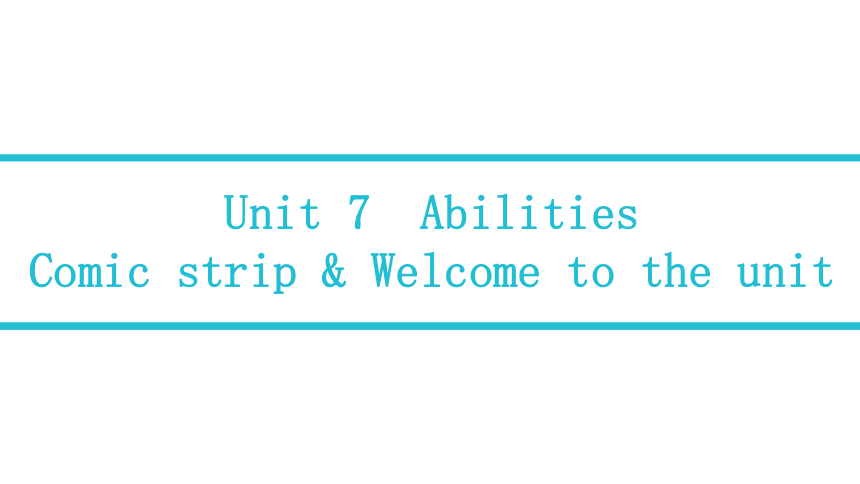 | |
| 格式 | zip | ||
| 文件大小 | 6.5MB | ||
| 资源类型 | 教案 | ||
| 版本资源 | 牛津译林版 | ||
| 科目 | 英语 | ||
| 更新时间 | 2022-04-13 20:54:34 | ||
图片预览

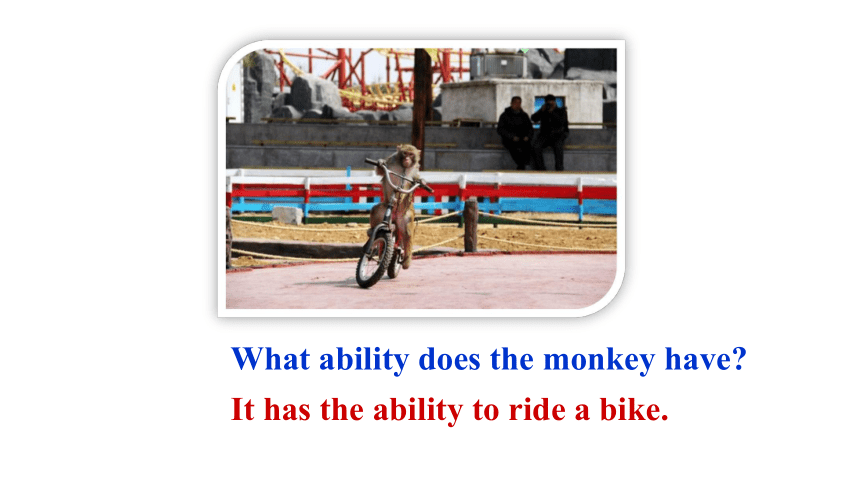
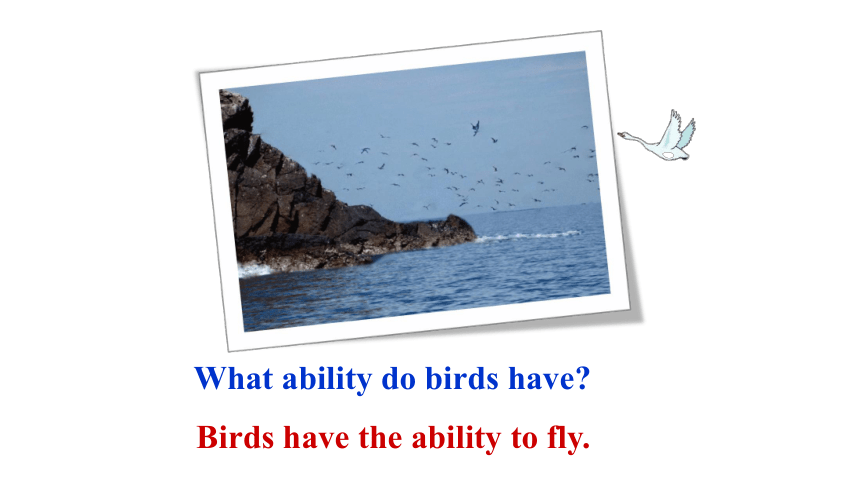

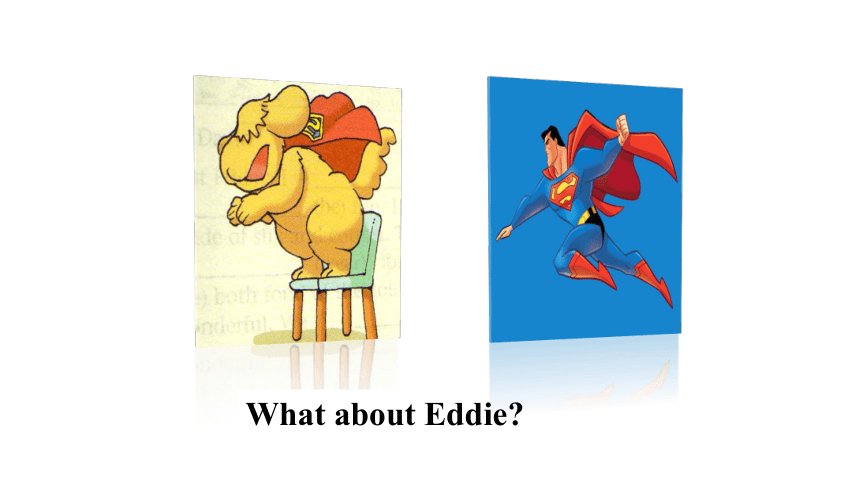
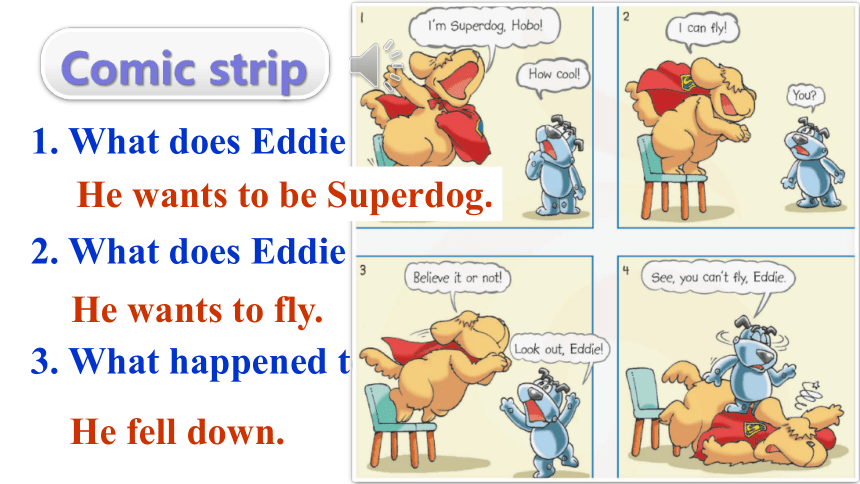

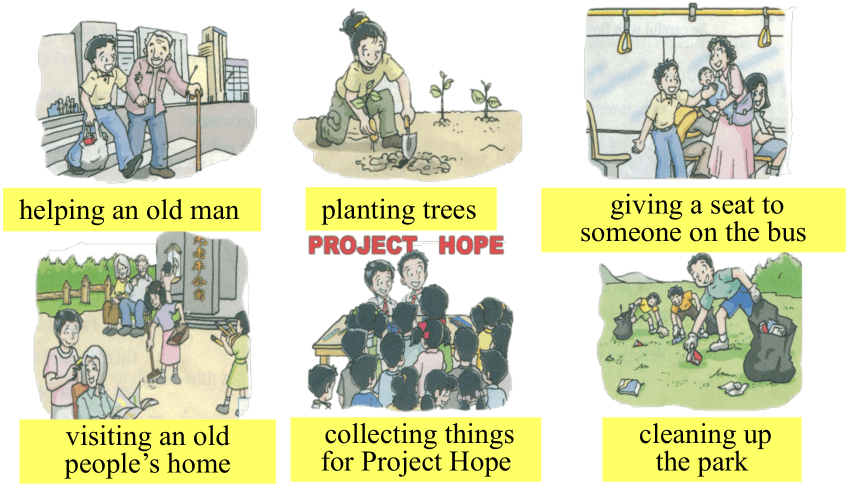
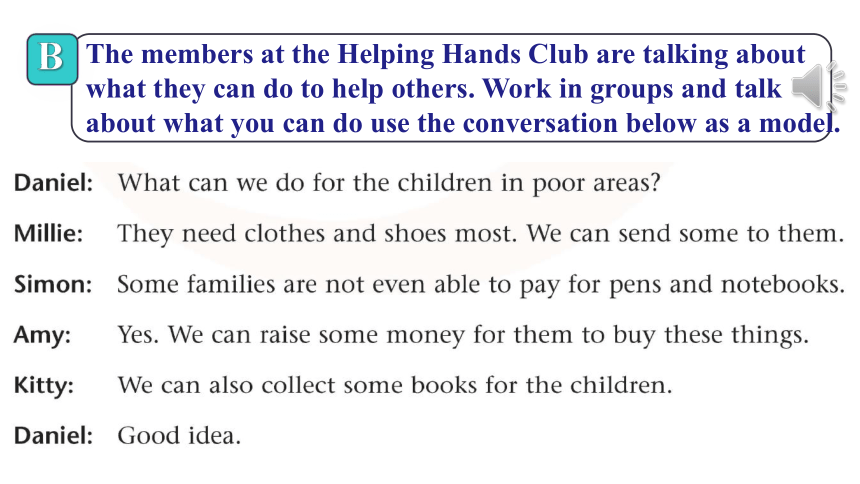
文档简介
(共21张PPT)
Unit 7 Abilities
Comic strip & Welcome to the unit
What ability does the monkey have
It has the ability to ride a bike.
What ability do birds have
Birds have the ability to fly.
Do you believe dogs have the ability to fly
What about Eddie
1. What does Eddie want to be
2. What does Eddie want to do
3. What happened to Eddie
Comic strip
He wants to fly.
He fell down.
He wants to be Superdog.
Daniel and his classmates are members of the Helping Hands
Club. Matchthe pictures below with the descriptions. Write
the correct letters in the boxes.
A
helping an old man
planting trees
giving a seat to someone on the bus
visiting an old people’s home
collecting things for Project Hope
cleaning up the park
The members at the Helping Hands Club are talking about
what they can do to help others. Work in groups and talk
about what you can do use the conversation below as a model.
B
● 1 believe vt. 相信
[观察] Nobody believes him.没有人相信他。
Tom is a person that you can believe in.
汤姆是一个你可以信任的人。
词 汇 点 睛
[探究] believe作动词,意为“相信”,其用法如下:
[拓展] believe it or not是固定结构,意为“信不信由你”; believe in 意为“信任,信仰(多指人的品德)”。
[注意] 当主句的谓语动词为think, guess, suppose, believe等且主语为第一人称时,从句若表示否定,一般将否定词not转移到主句的谓语中,这叫作“________”。
I don't believe he is wrong.
我相信他没有错。
否定前移
1.(1)根据汉语意思完成句子
我相信杰克不是一个懒惰的男孩。
I ________ ________ that Jack ________ a lazy boy.
don't believe
is
活 学 活 用
(2)单项选择
—I'll have a tennis game tomorrow. I'm a little bit nervous.
—Believe in ________. You're the best in our club.
A.you B.yourself
C.your D.yours
B
● 2 send vt. 发送;邮寄
[观察] We can send some to them.
我们可以寄给他们一些。
[探究] send 作动词,意为“发送;邮寄”,其过去式为__________。send sb. sth.=send sth. to sb.,意为“把某物寄给某人”。
sent
I often send my parents some money.
=I often send some money to my parents.
我经常给我的父母寄些钱。
2.My best friend sent me a book yesterday.(改为同义句)
My best friend sent ________ ________ ________ me yesterday.
a book to
活 学 活 用
●Some families are not even able to pay for pens and notebooks.
一些家庭甚至买不起钢笔和笔记本。
[探究] (1)even 作副词,意为“甚至”,通常用来修饰动词或名词,表示加强语气。
Even a child can understand it.
这就连小孩子也能理解。
句 型 透 视
(2)be able to意为“能,会”,后接动词原形,适用于各种时态,相当于情态动词________,但其没有人称和数的变化,且只适用于现在时态和过去时态。
Are you able to go swimming by yourself
你能独自去游泳吗?
Amy hurt her leg last Sunday, so she wasn't able to walk to school. 上周日埃米伤了腿,所以她不能步行去上学了。
can
(3)pay for意为“为……付款”,其主语是________。
How much did you pay for the beautiful T shirt
这件漂亮的T恤衫,你付了多少钱?
人
[拓展] “pay+金钱+for sth.”意为“付钱买某物”;pay for sb.意为“为某人付钱”。
Sorry, I have no money with me. Could you pay for me
对不起,我没有带钱,你能为我付钱吗?
Unit 7 Abilities
Comic strip & Welcome to the unit
What ability does the monkey have
It has the ability to ride a bike.
What ability do birds have
Birds have the ability to fly.
Do you believe dogs have the ability to fly
What about Eddie
1. What does Eddie want to be
2. What does Eddie want to do
3. What happened to Eddie
Comic strip
He wants to fly.
He fell down.
He wants to be Superdog.
Daniel and his classmates are members of the Helping Hands
Club. Matchthe pictures below with the descriptions. Write
the correct letters in the boxes.
A
helping an old man
planting trees
giving a seat to someone on the bus
visiting an old people’s home
collecting things for Project Hope
cleaning up the park
The members at the Helping Hands Club are talking about
what they can do to help others. Work in groups and talk
about what you can do use the conversation below as a model.
B
● 1 believe vt. 相信
[观察] Nobody believes him.没有人相信他。
Tom is a person that you can believe in.
汤姆是一个你可以信任的人。
词 汇 点 睛
[探究] believe作动词,意为“相信”,其用法如下:
[拓展] believe it or not是固定结构,意为“信不信由你”; believe in 意为“信任,信仰(多指人的品德)”。
[注意] 当主句的谓语动词为think, guess, suppose, believe等且主语为第一人称时,从句若表示否定,一般将否定词not转移到主句的谓语中,这叫作“________”。
I don't believe he is wrong.
我相信他没有错。
否定前移
1.(1)根据汉语意思完成句子
我相信杰克不是一个懒惰的男孩。
I ________ ________ that Jack ________ a lazy boy.
don't believe
is
活 学 活 用
(2)单项选择
—I'll have a tennis game tomorrow. I'm a little bit nervous.
—Believe in ________. You're the best in our club.
A.you B.yourself
C.your D.yours
B
● 2 send vt. 发送;邮寄
[观察] We can send some to them.
我们可以寄给他们一些。
[探究] send 作动词,意为“发送;邮寄”,其过去式为__________。send sb. sth.=send sth. to sb.,意为“把某物寄给某人”。
sent
I often send my parents some money.
=I often send some money to my parents.
我经常给我的父母寄些钱。
2.My best friend sent me a book yesterday.(改为同义句)
My best friend sent ________ ________ ________ me yesterday.
a book to
活 学 活 用
●Some families are not even able to pay for pens and notebooks.
一些家庭甚至买不起钢笔和笔记本。
[探究] (1)even 作副词,意为“甚至”,通常用来修饰动词或名词,表示加强语气。
Even a child can understand it.
这就连小孩子也能理解。
句 型 透 视
(2)be able to意为“能,会”,后接动词原形,适用于各种时态,相当于情态动词________,但其没有人称和数的变化,且只适用于现在时态和过去时态。
Are you able to go swimming by yourself
你能独自去游泳吗?
Amy hurt her leg last Sunday, so she wasn't able to walk to school. 上周日埃米伤了腿,所以她不能步行去上学了。
can
(3)pay for意为“为……付款”,其主语是________。
How much did you pay for the beautiful T shirt
这件漂亮的T恤衫,你付了多少钱?
人
[拓展] “pay+金钱+for sth.”意为“付钱买某物”;pay for sb.意为“为某人付钱”。
Sorry, I have no money with me. Could you pay for me
对不起,我没有带钱,你能为我付钱吗?
